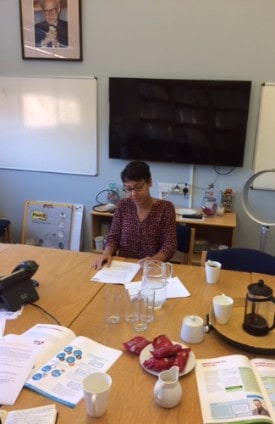Today’s blog is the second posted by NEC Marketing and Policy Intern Rea Duxbury, pictured above. Rea worked with NEC during the summer and has now returned to the University of Cambridge, where she is studying for a degree in Human, Social and Political Sciences. You can read her previous blog post here: ‘How do we reverse the decline in mature student numbers?‘
Before applying to be a Marketing and Policy Intern with the National Extension College I had not heard of the organisation nor was not aware of what it did. However, after working here for three months I believe that I have gained a good understanding of NEC, the richness of its history and the climate around distance learning.
This is due to the fact that I have been given genuine responsibilities and tasks to do which has not only made me feel like a ‘proper’ employee but has enabled me to quickly get to grips with the terminology used in the office and the priorities of the charity during its busiest months.
Fortunately, just like the flexibility of NEC courses, I have been given the flexibility to explore what I am interested in. For example, being a Politics and Sociology student I am interested in a career in policy. Therefore it has been fantastic to be able to put together a short policy paper for Cambridge Labour MP Daniel Zeichner on lifelong learning and NEC’s role as a pioneer within the sector for over 50 years.
I have also enjoyed looking at ways to improve NEC’s social media presence, mostly because I get to read so many inspiring case studies from students! As well as the short policy paper and social media, I have designed eshots, analysed data from introductory assignments to gain a better understanding of STEM students and put together mailing lists for the new guide to courses.
I have become a lot more confident in my abilities and the skills that I can bring to the working world when I graduate. For example, I have never liked maths and didn’t think I was particularly good at spreadsheets, but after analysing data on the introductory assignments I feel much better about these two areas. Creating comparative graphs and calculating response percentages would have definitely phased me before I was given this project.
It is this hands-on experience which will not only make me more confident when applying for jobs but will enable employers to see that I have made an effort to gain experience during the summer months. As NEC founder Michael Young said back in 1988: “the old education fed by the acquisition of book knowledge will not be appropriate for many of them. These new students will need practical skills.”
As someone who is particularly interested in educational inequality, it is only through working at NEC that my eyes have been opened to the importance of adult education and how much more support needs to be given to mature, part-time and second-chance learners. However, it has also made me feel more optimistic about the future. With people living longer and great technological advances, individuals don’t have to go straight from A levels to a degree or from a degree to postgraduate qualifications but can keep returning to learning throughout their lives, making organisations such as NEC more and more important.
In the world of unpaid internships I would like to highlight that despite the fact that NEC is a small charity, it does pay its interns – an example many other organisations should follow. On its advertisement of the internship, its description as a ‘small, friendly office’ has rung true and I have thoroughly enjoyed my time here.
Going back to university in the next couple of weeks I would like to thank both NEC and Murray Edwards Gateway Programme for the opportunity it has given me. I look forward to seeing NEC grow over the next couple of years. With new courses, partnerships, website development and an Instagram account on the way there is lots to be excited about!


Add a new comment
Current comments: 0